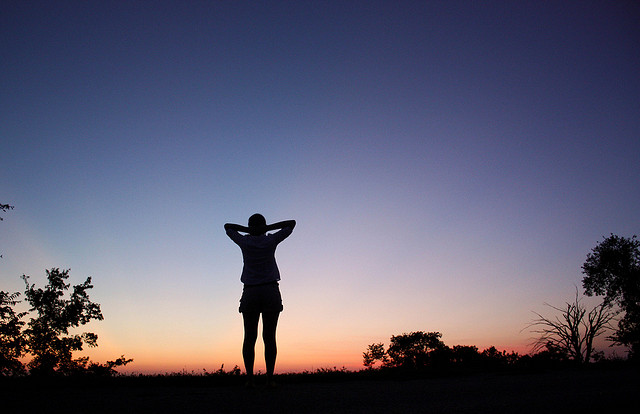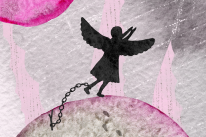
“The next message you need is always right where you are.” ~Ram Das
I try to exercise mindfulness in all things. Nowhere has this been as important for me as in my relationships.
I try to remember that I am not the same person I was as a child. People in any family play different roles at different times.
It’s been heartening to see myself, formerly a frequent recipient of unwanted advice, in a position of sharing the wisdom of my experience and being a conscious example of what I recommend.
I am a younger sister. I am fifty-six years old and own a home, but in my family, I will always be the younger sister.
The difference in age (seven years) only hints at the contrast between my sister Barbara and me. Others have unfailingly viewed her as smart, competent, successful. People have often described me as clever, disarming, creative.
While others have always seen me as good-hearted and funny, I used to feel that I would never measure up to my older sister.
I knew I would never make a pear tart or play the cello. I would never be able to create a pivot table with Excel and I’d probably never manage a huge investment portfolio.
The comparisons used to bother me. I wished that they didn’t. But I did seek some elusive sort of respectability most of my life, the kind that seems important to a younger sister.
Last April, my older sister was diagnosed with lung cancer. After some quickly scheduled tests, we learned that it was operable.
As was her way, she did an impeccable job researching surgeons and treatment options. She did a lot of work in short order to facilitate making sound medical decisions.
I remember sitting in the surgical waiting room with her husband and a family friend. We tried to keep each other positive while waiting for the very in-demand specialist to make his post-op consult.
It looked like we were lucky. Two lobes were removed from her right lung, but no radiation or chemo was indicated. Through the miracle of modern medicine, she was awake within a few hours.
Almost as soon as she gained consciousness, she expressed worry about her husband of forty years, his inexperience at handling simple household chores like making his own breakfast.
She noted feeling anxious about how often she’d have to monitor her lungs to make sure the cancer didn’t come back.
At this point, I was reluctant to remind her how lucky she was that her surgery appeared to be so successful. At some level, she knew, but she was not accustomed to letting her mind dwell on the good that could be found in the present.
Over the next few weeks, after she returned home and started living her normal life again, she started attending a survivor group that showcased the topic of mindfulness.
Now we started to experience a little reversal of roles. Instead of placing a premium on the ability to plan and organize, the most important thing for her became how to live in the present moment.
A freelance writer and single most of my life, I learned how to live without a large measure of structure. For the past fifteen years, I have also kept a meditation practice. Living in the present moment and living mindfully was something I knew something about.
“I am not Yoda or anything,” I told her, “but I can tell you what I’ve learned about mindfulness.”
I began a habit of calling her at least once a week. I’d let her empty her mind of its many worries. I asked her to share some recipes. And I dispensed some principles that became important to me in my life.
1. Never value anything because of how much, or how little, it costs.
I knew I would probably never instill her with my love for thrifting, but letting go of this kind of judgment about money has allowed me to find pleasure in the present more easily. Sometimes the simple things in life end up being the most valuable if we allow ourselves to enjoy them.
2. Don’t expect the worst. At minimum, stay neutral.
Without trying to sound like Pollyanna, I encouraged her to look at statistics and probabilities. Her thoughts had a tendency to sink to the bottom of the pond. “Statistically speaking,” I’d say, “things are just as likely to get better as they are to get worse. Stay open to the possibility of good things.”
3. Don’t miss an opportunity to compliment someone, say thanks, or express affection.
I hoped this suggestion didn’t sound maudlin, and it might have if she interpreted the underlying reason as avoiding regret. Fortunately, she understood the other upside of these gestures—making a difference for someone else. One of the main ways I have found to drop preoccupations with worry has been to think of others and not just myself.
4. Pause periodically during the day and observe your own breath.
I knew this suggestion was emotionally charged for her since she was learning how to breathe with thirty percent less lung capacity.
I added, “I’m not telling you to watch your breath so that you think about how much harder your lungs are working, although it is wonderful how well a body can adapt. When you watch your breath, you become aware of how to slow down. You don’t have to finish everything right now.”
5. Any time you can spend making friends or nurturing relationships is the most worthwhile way you can spend your time.
Go out to lunch with you pals more. Enjoy your experiences. Don’t just dwell on your accomplishments or worry about planned tasks.
So far, our weekly talks have not even touched on my favorite reason to exercise mindfulness, which I will perhaps save for the next time we go out to lunch:
For me, the greatest gift of mindfulness is noticing yourself in a state you would like to live in so you can practice consciously bringing that state to each moment. Once you know what it would look like for you, being the person you want to be is far more doable.
Catching yourself feeling gratitude, you can live more gratefully. Catching yourself feeling love, you can live more lovingly.
Photo by Gibson Regester
About Deborah Hawkins
Deborah Hawkins is a writer and small group facilitator. She blogs on mindfulness and appreciation at http://www.nosmallthing.net/. She is starting to lead Attitude of Gratitude writing groups while working to get her book on the topic published.












 Though I run this site, it is not mine. It's ours. It's not about me. It's about us. Your stories and your wisdom are just as meaningful as mine.
Though I run this site, it is not mine. It's ours. It's not about me. It's about us. Your stories and your wisdom are just as meaningful as mine.
Living in the present is key to happyness. Thanks for this post!
Thanks for this reminder Deborah. Being in the now is always our point of power. Your sister is totally blessed to have you in her life to support and share your ability to live right here and now. One of my favourite mantras for myself is ‘be here, now’. It always brings my thoughts right back to this moment where I can choose how I want to feel and this always allows me to experience a happy day.
e-hugs
Elle
As a very recent post-epileptic I agree but what if very close relationships don’t quite get this and I make things “worse” for them by trying to live that way?
Thanks for this post. I have just completed DBT training for my teen daughter..with me as her cheerleader. What you wrote rings true. thank you. i hope it helps others.
Thanks for the tips Deborah! I work on #2 the most. I have a tendency to look into the future for all possible outcomes which makes me anxious. Things are never as problematic as I can imagine. Staying neutral is perfect and keeps the pit in my stomach from popping up.
Thanks for sharing your tips on how to be mindful.
That is an awesome post! Thanks for sharing!
The importance of number 3 really cant be overstated. I have had days where a single act of kindness completely turned my day around, and I make it a daily habit to do this for others every time I can. A simple smile, or compliment can literally be the spark that causes drastic changes in someone’s life, or at least improves the quality of it. This is a great list, we could all learn a lot from it, thanks for sharing!
David Goettsch (Personal Growth Project)
http://personal-growth-project.com/
Beautiful post, Deborah. I needed this!
A heartfelt honest post deborah. You write beautifully and remind us of why living in the moment is always a gift.
Karen
This is wonderful Deb–so glad you wrote this and I read it! Glad to be a part of your world!
AWESOME!!!! GREAT tips, thank you for sharing this wisdom! 🙂
A very inspiring article.
Linked here from http://aninteriorforest.com/blog/breath/
Thank you
Thank you. I have been suffering depression recently and find my mind racing and life has felt like a blur. I was reading about mindfulness this morning and a letter came through my door telling me something important that I send in the mail had not turned up. Instead of panicking and filling my head with scenario’s I became mindful and dealt with the situation with a clear head. I found out that the letter did arrive after all. So much easier. Thank you for your words they helped me out. I will keep practicing this.